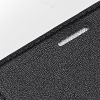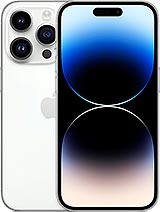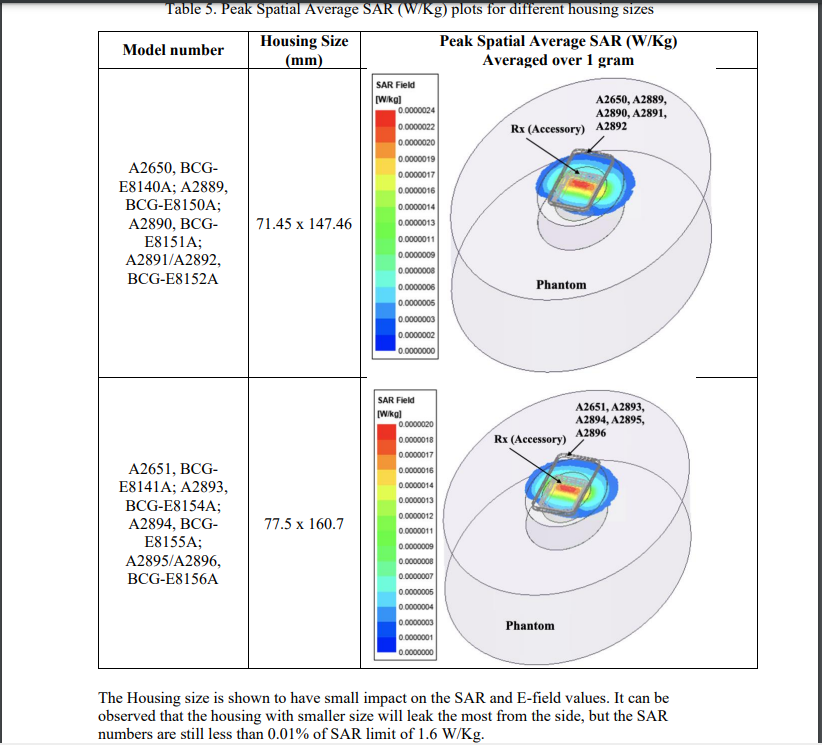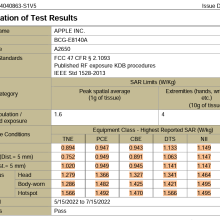Apple iPhone 14 Pro Radiation Levels
| Radiation Levels | Head | Body | Hot Spot |
|---|---|---|---|
| Cellular Only | 1.15 W/kg | 1.15 W/kg | 1.15 W/kg |
| Wi-Fi + Cellular | 1.46 W/kg | 1.50 W/kg | 1.57 W/kg |
Apple iPhone 14 Pro SAR Level Summary:
The cellular transmission SAR values for the Apple iPhone 14 Pro (FCC ID BCG-E8140A) are 1.15 W/kg (watts per kilogram) at the head and 1.15 W/kg when worn on the body. The hotspot/Airplay SAR level is 1.15 W/kg. The simultaneous transmission SAR values for iPhone 14 Pro (cellular plus Wi-Fi) is 1.46 W/kg at the head, 1.50 W/kg when worn on the body, and 1.57 W/kg when used as a hotspot simultaneously with other transmitters active.
iPhone 14 Pro
| Select a phone to compare iPhone 14 Pro SAR levels to other popular phones |
| Cell Phone Usage & Radiation Exposure | ||||||||||||
Apple iPhone 14 Pro Safety Tip:How Much Will Turning Off Wi-Fi and Bluetooth Reduce Radiation?This SAR chart reveals how turning off Wi-Fi and Bluetooth on your Apple iPhone 14 Pro can significantly reduce your exposure to radiation. Our SAR comparison chart shows that by simply turning off Wi-Fi and Bluetooth transmitters, you can lower the RF radiation exposure to your head by 21.4%, and you can lower exposure to the body by 23.1%, when considering these differences between cellular-only (Wi-Fi/Bluetooth OFF) and simultaneous use exposure (Wi-Fi/Bluetooth ON), a wise way to reduce excessive phone radiation is to tap off unnecessary transmitters when not in use! Additionally, when using your phone as a hotspot, turning off Bluetooth can reduce your exposure by up to 36.5% according to the FCC SAR report for device number BCG-E8140A. Apple iPhone 14 Pro SAR Levels
|
Key Takeaways
- Children vs Adults: Children have higher SAR levels due to thinner skulls and developing tissues, making them more vulnerable to radiation.
- Wi-Fi Impact: Simultaneous use of cellular and Wi-Fi transmission increases SAR levels for all age groups.
- Precautionary Measures: Using radiation protection products like QuantaCase can help mitigate these risks, especially for younger users.
By understanding these differences, parents and guardians can make informed decisions to better protect their children from excessive microwave radiation exposure, emphasizing the need for safer smartphone usage practices and protective accessories like QuantaCase.

| Children vs Adults Radiation Exposure |
The Specific Absorption Rate (SAR) of a mobile device measures the amount of radio frequency energy absorbed by the body during device usage.
The SAR values for the iphone-14-pro (FCC ID BCG-E8140A) are as follows:
- 1.15 W/kg when held at the head with cellular transmission only
- 1.15 W/kg when worn on the body with cellular transmission only
- 1.15 W/kg when used as a Hotspot or Airplay
- 1.46 W/kg when held at the head with simultaneous cellular and Wi-Fi transmission
- 1.5 W/kg when worn on the body with simultaneous cellular and Wi-Fi transmission
- 1.57 when used as a Hotspot simultaneously with other transmitters active.
Apple iPhone 14 Pro - SAR Levels
FCC SAR Levels
- FCC Approval Date This is the date the phone SAR test was completed before the phone's release to the public as required by law. 20 July 2022
- FCC ID The FCC ID is the code used to register a device for FCC compliance BCG-E8140A
- FCC Report Link A direct link to the FCC's website for confirming SAR levels that are listed on our website - We did the homework for you!
- US SAR Ratings USA Legal Limit is 1.6 W/kg USA Legal Limit is 1.6 W/kg - FCC SAR testing is measured in watts per kilogram (or W/kg) averaged over ONE gram of simulated biological tissue.
- Head SAR Level SAR test when held against your head when only using cellular service. Wifi and other transmitter are NOT active 1.15 W/kg
- Body SAR Level SAR test when held against your body only using cellular service. Wifi and other transmitter are NOT active 1.15 W/kg
- Product Specific Use SAR test when held against your body only using the phone as a hotspot. Cellular and other transmitter are NOT active 1.147 W/kg
- Simultaneous Transmission The highest possible SAR recorded with ALL transmitters active, Cellular, WiFi, and Hotspot 1.566 W/kg
- Simultaneous Head The highest possible SAR test when held against your HEAD with cellular and WiFi transmitters active, 1.464 W/kg
- Simultaneous Body The highest possible SAR test when held against your BODY with cellular and WiFi transmitters active, 1.495 W/kg
- Hotspot SAR The highest possible SAR test when held against your BODY using the phone as a hotspot with cellular and WiFi transmitters active, 1.566 W/kg
EU SAR Level
- EU SAR Ratings European Legal Limit is 2.0 W/kg - EU SAR testing is measured in watts per kilogram (or W/kg) averaged over TEN grams of simulated biological tissue.
- Head SAR Level 0.98 W/kg
- Body SAR Level 0.98 W/kg
FCC SAR Report BCG-E8140A model A2650 (USA)
bcg-e8140a-a2650-iphone-14-sar-level
Apple iPhone 14 Pro SAR test reports filed with the Federal Communications Commission FCCID bcg-e8140a— the Specific Absorption Rate (SAR) Apple iPhone 14 Pro is: 1.15 watts per kilogram (w/kg) at your head and 1.15 W/kg when worn on your body. The Apple iPhone 14 Pro hotspot SAR is 1.147 W/kg, and its SAR for max simultaneous transmission (cellular plus Wi-Fi) is 1.566 W/kg when used as a hotspot simultaneously with other transmitters active. There is also an Apple iPhone 14 Pro SAR rating for head and body simultaneous transmission usage (cellular plus Wi-Fi). Simultaneous transmission at your head absorbs radiation at 1.464 W/kg, and simultaneous usage at the body is 1.495 W/kg.
It’s official, size does matter…. Well, a little, according to Apple! The latest 2022 Apple iPhone SAR report found that “The Housing size is shown to have a small impact on the SAR and E-field values. It can be observed that the housing with a smaller size will leak the most from the side, but the SAR numbers are still less than 0.01% of the SAR limit of 1.6 W/Kg.”
So people that bought the smaller iPhone might be getting more than they bargained for, like just a little more radiation penetrating the brain. How do these little-screen iPhone radiation leakers compare to the big-screen iPhone models? Let’s put the size difference into perspective. 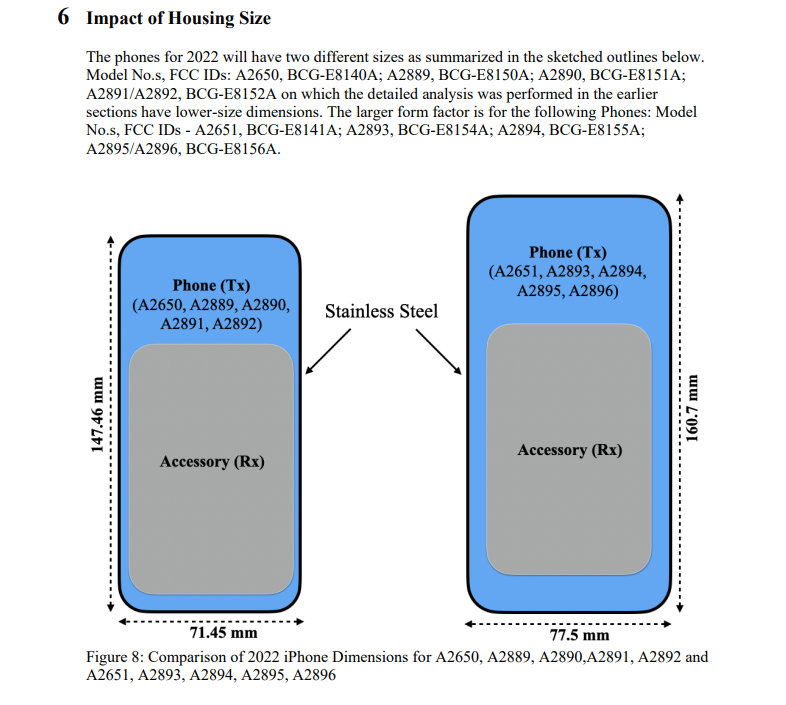
The following graph shows the radiation surrounding a small and large iPhone form factor. As stated in the report, “It can be observed that the housing with a smaller size will leak the most from the side. “. This isn’t readily available radiation exposure information as it takes a fair amount of digging to find the official reports. However, I think this is something every consumer has a right to know that the form factor of an iPhone can influence the amount of radiation the body absorbs.
Now on to the actual SAR values for the iPhone 14 Pro. and the one area the iPhone Pro beats the iPhone Pro Max… Radiation Leakage!
Versions: A2890 (International), BCG-E8151A; A2650 (USA), BCG-E8140A; A2889 (Canada, Japan), BCG-E8150A; A2892 (China, Hong Kong) and A2891 (Russia), BCG-E8152A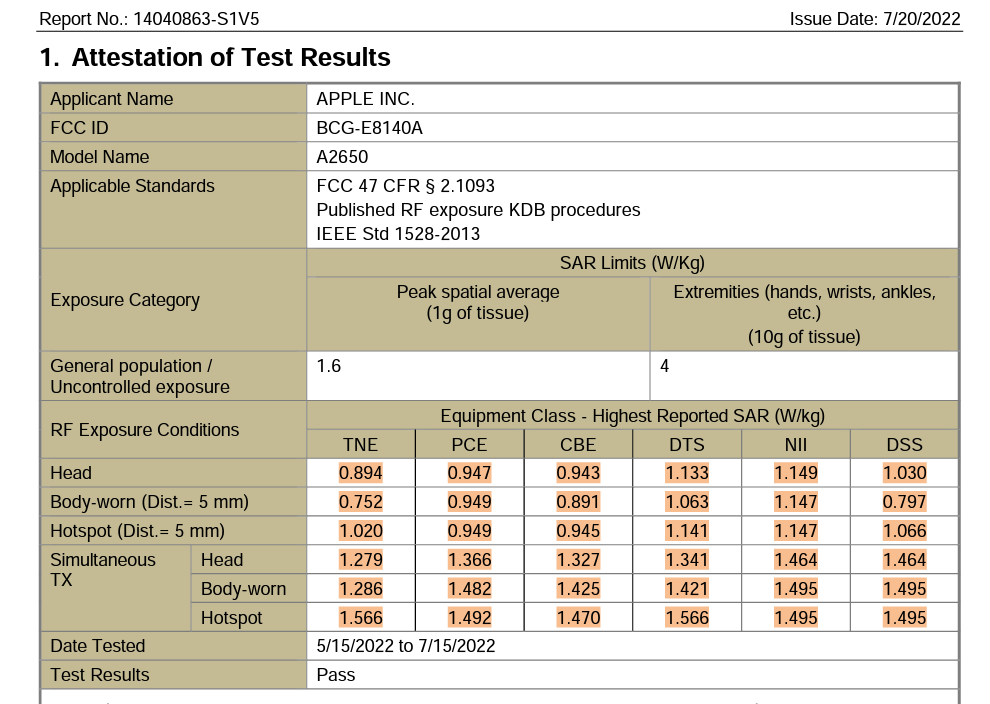
SAFETY TIP: The larger form factor that lets less radiation leak from the sides has the following Model No.s, FCC IDs –
Versions: A2894 (International); A2651 (USA), BCG-E8141A; A2893 (Canada, Japan), BCG-E8154A; A2896 (China, Hong Kong) and A2895 (Russia), BCG-E8156A;
Unofficial preliminary specifications
| Network | Technology | GSM / CDMA / HSPA / EVDO / LTE / 5G |
|---|---|---|
| 2G bands | GSM 850 / 900 / 1800 / 1900 – SIM 1 & SIM 2 (dual-SIM) | |
| CDMA 800 / 1900 | ||
| 3G bands | HSDPA 850 / 900 / 1700(AWS) / 1900 / 2100 | |
| CDMA2000 1xEV-DO | ||
| 4G bands | 1, 2, 3, 4, 5, 7, 8, 12, 13, 17, 18, 19, 20, 25, 26, 28, 30, 32, 34, 38, 39, 40, 41, 42, 46, 48, 66 – A2890, A2892 | |
| 1, 2, 3, 4, 5, 7, 8, 11, 12, 13, 14, 17, 18, 19, 20, 21, 25, 26, 28, 29, 30, 32, 34, 38, 39, 40, 41, 42, 46, 48, 53, 66, 71 – A2650, A2889 | ||
| 1, 2, 3, 4, 5, 7, 8, 12, 13, 17, 18, 19, 20, 25, 26, 28, 30, 32, 34, 38, 39, 40, 41, 42, 46, 48, 66 – A2891 | ||
| 5G bands | 1, 2, 3, 5, 7, 8, 12, 20, 25, 26, 28, 30, 38, 40, 41, 48, 66, 70, 77, 78, 79 SA/NSA/Sub6 – A2890, A2892 | |
| 1, 2, 3, 5, 7, 8, 12, 14, 20, 25, 26, 28, 29, 30, 38, 40, 41, 48, 53, 66, 70, 71, 77, 78, 79, 258, 260, 261 SA/NSA/Sub6/mmWave – A2650 | ||
| 1, 2, 3, 5, 7, 8, 12, 14, 20, 25, 26, 28, 29, 30, 38, 40, 41, 48, 53, 66, 70, 71, 77, 78, 79 SA/NSA/Sub6 – A2889 | ||
| 1, 2, 3, 5, 7, 8, 12, 20, 25, 26, 28, 30, 38, 40, 41, 48, 66, 70, 77, 78, 79 SA/NSA/Sub6 – A2891 | ||
| Speed | HSPA 42.2/5.76 Mbps, LTE-A, 5G, EV-DO Rev.A 3.1 Mbps |
| Launch | Announced | 2022, September 07 |
|---|---|---|
| Status | Available. Released 2022, September 16 |
| Body | Dimensions | 147.5 x 71.5 x 7.9 mm (5.81 x 2.81 x 0.31 in) |
|---|---|---|
| Weight | 206 g (7.27 oz) | |
| Build | Glass front (Gorilla Glass), glass back (Gorilla Glass), stainless steel frame | |
| SIM | Dual SIM (Nano-SIM and eSIM) or Dual eSIM – International Dual eSIM with multiple numbers – USA Dual SIM (Nano-SIM, dual stand-by) – China |
|
| IP68 dust/water resistant (up to 6m for 30 mins) Apple Pay (Visa, MasterCard, AMEX certified) |
| Display | Type | LTPO Super Retina XDR OLED, 120Hz, HDR10, Dolby Vision, 1000 nits (typ), 2000 nits (HBM) |
|---|---|---|
| Size | 6.1 inches, 91.7 cm2 (~87.0% screen-to-body ratio) | |
| Resolution | 1179 x 2556 pixels, 19.5:9 ratio (~460 ppi density) | |
| Protection | Scratch-resistant ceramic glass, oleophobic coating | |
| Always-On display |
| Platform | OS | iOS 16, upgradable to iOS 16.0.2 |
|---|---|---|
| Chipset | Apple A16 Bionic (4 nm) | |
| CPU | Hexa-core (2×3.46 GHz Everest + 4×2.02 GHz Sawtooth) | |
| GPU | Apple GPU (5-core graphics) |
| Memory | Card slot | No |
|---|---|---|
| Internal | 128GB 6GB RAM, 256GB 6GB RAM, 512GB 6GB RAM, 1TB 6GB RAM | |
| NVMe |
| Main Camera | Triple | 48 MP, f/1.8, 24mm (wide), 1/1.28″, 1.22m, dual pixel PDAF, sensor-shift OIS 12 MP, f/2.8, 77mm (telephoto), 1/3.5″, PDAF, OIS, 3x optical zoom 12 MP, f/2.2, 13mm, 120 (ultrawide), 1/2.55″, 1.4m, dual pixel PDAF TOF 3D LiDAR scanner (depth) |
|---|---|---|
| Features | Dual-LED dual-tone flash, HDR (photo/panorama) | |
| Video | 4K@24/25/30/60fps, 1080p@25/30/60/120/240fps, 10-bit HDR, Dolby Vision HDR (up to 60fps), ProRes, Cinematic mode (4K@24/30fps), stereo sound rec. |
| Selfie camera | Single | 12 MP, f/1.9, 23mm (wide), 1/3.6″, PDAF, OIS (unconfirmed) SL 3D, (depth/biometrics sensor) |
|---|---|---|
| Features | HDR, Cinematic mode (4K@24/30fps) | |
| Video | 4K@24/25/30/60fps, 1080p@25/30/60/120fps, gyro-EIS |
| Sound | Loudspeaker | Yes, with stereo speakers |
|---|---|---|
| 3.5mm jack | No |
| Comms | WLAN | Wi-Fi 802.11 a/b/g/n/ac/6, dual-band, hotspot |
|---|---|---|
| Bluetooth | 5.3, A2DP, LE | |
| GPS | Yes, with dual-band A-GPS, GLONASS, GALILEO, BDS, QZSS | |
| NFC | Yes | |
| Radio | No | |
| USB | Lightning, USB 2.0 |
| Features | Sensors | Face ID, accelerometer, gyro, proximity, compass, barometer |
|---|---|---|
| Ultra Wideband (UWB) support Emergency SOS via satellite (SMS sending/receiving) |
| Battery | Type | Li-Ion 3200 mAh, non-removable (12.38 Wh) |
|---|---|---|
| Charging | Fast charging, 50% in 30 min (advertised) USB Power Delivery 2.0 MagSafe fast wireless charging 15W Qi wireless charging 7.5W |
| Misc | Colors | Space Black, Silver, Gold, Deep Purple |
|---|---|---|
| Models | A2890, A2650, A2889, A2892, iphone15,2 | |
| SAR | 1.15 W/kg (head) 1.15 W/kg (body) | |
| SAR EU | 0.98 W/kg (head) 0.98 W/kg (body) | |
| Price | ₹ 159,900 / $ 1,499.99 / £ 1,099.00 / € 1,299.00 |
| Tests | Performance | AnTuTu: 968412 (v9) GeekBench: 5346 (v5.1) GFXBench: 60fps (ES 3.1 onscreen) |
|---|---|---|
| Display | Contrast ratio: Infinite (nominal) | |
| Camera | Photo / Video | |
| Loudspeaker | -26.2 LUFS (Good) | |
| Battery life | Endurance rating 86h |

